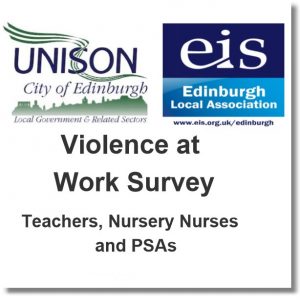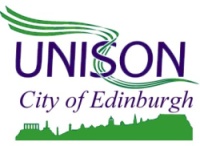
UNISON and EIS surveys published today paint a bleak picture of the violence in Edinburgh’s schools and classes suffered by teachers, nursery nurses and pupil support assistants. Many staff report experiencing violence daily at work and a third of support staff say they do not feel safe at work.
The unions have presented councillors and chief officials with an 11-point plan to tackle the issue as the surveys revealed that seven out of 10 of nursery nurses and pupil support assistants and over half of teaching staff felt that suffering violence was seen as ‘part of the job’ by employers. Staff said they were dissatisfied with how the council manages issues of violence and aggression.
Almost a third (32.6%) of nursery nurses and pupil support assistants reported they did not feel safe at work and 40% of teaching staff said they felt anxious about some classes because of worries about violence.
Over half of nursery nurses and pupil support assistants (50.6%) said they witnessed violence daily or several times per day and 48.7% had directly experienced violence at least once per week. Almost 15% of teaching staff in early years reported experiencing daily violence over the last year.
Almost 90% of teaching staff said they had not had any relevant training on dealing with violent behaviour in school.
UNISON Edinburgh branch communities and families vice-convener Graham Neal said: “With a third of staff not feeling safe at work and 70% feeling the employer just sees violence as part of the job, there is a real crisis here that the council must face up to.
“Our members are committed to the children they work with but we need greater clarity about what happens when schools cannot meet the needs of a child. We are calling for a review of the criteria for placing children in special schools and schools need to be properly staffed to deal with actual intake.
“Most of all we need the council to recognize the problem and be clear that violence is not ‘part of the job’ and ensure that our members are given the support to manage these difficult situations.”
EIS Edinburgh LA Secretary Alison Murphy said: “Whilst it is important to remember that most pupils in our schools are well behaved and engaged with learning, there are, unfortunately, a minority whose behavior is proving increasingly difficult, or impossible to manage. This is a consequence of ‘inclusion on the cheap’.
“At exactly the same time as we started moving children with increasingly complex medical, social, emotional or learning needs into mainstream classes, we embarked on a decade of cuts in resourcing and staffing that makes it impossible to meet these children’s needs. The impact on staff who must try to manage this, on the other children who daily witness violent outbursts and whose teachers cannot meet their needs because of constant crisis management, is severe.
“Maybe worst of all is the dreadful impact on these children themselves, whose behavior is often a result of severe distress, and who need skilled, well-resourced and appropriately focused help to enable them to overcome their many challenges but who are, instead, being failed by a system that is beyond breaking point.”
The unions’ 11-point plan is headed with a call for “a culture where all staff feel their health and well-being is paramount, and that violence against staff is treated seriously, and not seen as an inevitable part of the job.”
It includes better training and staffing levels, better support for staff and better recording of incidents, better risk assessments, and targeted action where there are particular problems.
Notes for editors:
UNISON represents nursery nurses, pupil support assistants and other support staff in Education in Edinburgh. The EIS represents teaching staff across all sectors in the council.
UNISON and the EIS ran separate surveys after growing reports from their members about violence. Both surveys had a 35% response (1,378 respondents) from the members contacted which is a high response in terms of such surveys.
A PDF presentation of the surveys with full details can be seen at https://unison-edinburgh.org.uk/wp-content/uploads/2018/11/UNISON-EIS-violence-survey-presentation-for-JCG.pdf
Some comments from respondents:
Support staff:
“I am committed to working with children with additional needs and accept that violent behaviour can result from these needs. However, I feel we are increasingly at risk from this due to policies which push inclusion, but DO NOT provide funding and resources to support this safely.”
“Aggression from some of our pupils has always existed, but I feel that incidents have increased in the last 5 years to an unacceptable level, and in the last year I feel that staff safety has been compromised. I no longer feel safe at work, and don’t feel there is a duty of care from management.”
Teaching staff
“I have been bitten, punched, kicked, spat on, been pulled by the hair to the ground and even had a child try to get their fingers into my eyes regularly over the past year.”
“I feel fully supported by the management in school but I know that their hands are tied. I know that this is a side effect of inclusion and children not being in the right environment for their needs.”
“I think the level of violence and verbal abuse has increased greatly in my 20 years of teaching. I think what we ‘accept’ as ‘norm’ in 2018 would not have been accepted in 1998.”
“My experience is that due to public service cuts, mainstream classroom teachers are increasingly expected to meet the needs of learners who require some of the highest levels of support alongside all other learners – this is a pipe dream in terms of what one person can consistently achieve in their work.”

